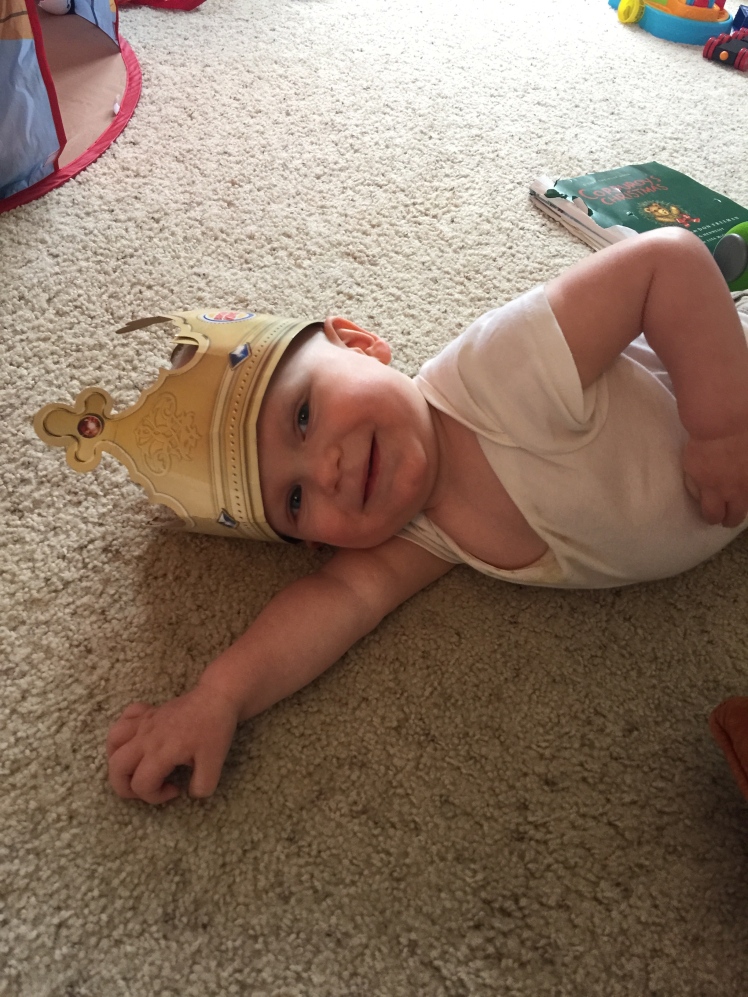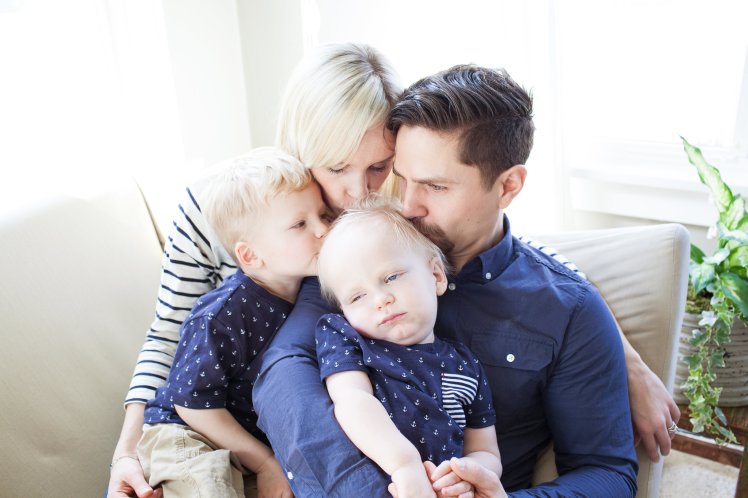Sam and I waited three days after Joey was born before we agreed on his name – Josiah Michael Scaparotti (I remember the nurse telling us we couldn’t leave the hospital before we had named our baby and filled out all the paperwork). We chose Josiah partly because we love the story of king Josiah, but also because of the powerful meaning of his name – “Healed by Jehovah or God will support” (http://www.biblestudytools.com/dictionary/josiah/)
The months following Josiah’s diagnosis were challenging in so many ways, but one thing I really wrestled with (and to some extent still do) was reconciling the mystery of our very painful reality and the meaning of his name. It almost seemed cruel. Some people interpreted “healed” as his heavenly body. That death would ultimately bring him true healing. I’d say they were right. But while there’s hope in the promise of a glorious life after this their words many times felt empty and rather hollow. Others would fiercely pray for Josiah’s healing. Reminding us to stand firm on his promises of healing in this life rather than focusing on the eternal life of our son’s soul. That miracles happen and we had to believe for the miraculous touch of Christ. Sam and I believed (and still do) this wholeheartedly to be true and possible, yet would find ourselves having similar feelings of emptiness and confusion after many of these conversations. Others said nothing at all and I don’t blame them, what really is there to be said anyway.

Can God heal our son this side of heaven? Without a doubt. But if He doesn’t, does the meaning of our son’s name still hold true? Yes, yes it does. I also believe that our son is fearfully and wonderfully made. That His plan for our son is to prosper him and to give him hope and a future. I believe God has a plan and purpose for all of us. I still don’t know or understand for that matter, I don’t think I ever will, the meaning of suffering in young, innocent babies and children. And to be honest, I’m ok with that. I no longer seek to find the meaning with everything because sometimes there might not be one. I have yet to hear a good, truth-filled argument for the meaning of human trafficking, child molestation, rape and murder. Rather I believe we live in a fallen world and some things, in and of themselves simply have no meaning. God can redeem and restore, give us beauty for ashes and make things new. And while I don’t see meaning in our son’s pain and suffering I believe his life has great meaning and that he will touch more people in his short lifetime than most of us ever will. After all, behind the ‘GM-1’ label is an individual – a sweet, pure little soul. He might not communicate with words, never has and never will, but he has taught us more about life than any amount of books, wise sayings and intellectual conversations ever will. He reminds us on a daily basis of how fragile yet beautifully precious life is and how easily we take things for granted.
So why is it that we do so well talking about eternity and living healed and restored in heaven or experiencing the power of his healing power here on earth, but don’t have much to say about the gap in between? I believe this would be what the psalmist referred to as ‘the valley of the shadow of death’…. And my guess is that it’s too painful. In today’s society we are trained to avoid pain at all cost. There’s a drug (or quite the slew) for anything from headache to heartache. And if that doesn’t do it we run to alcohol, drugs, entertainment, or sex. All to avoid living in pain and as a result we don’t know how to do it well.
So is there anything to learn in the valley? I find that these days the main focus is on how to get to the top, how to break the chains, discover our potential; God-given talents and abilities, how to soar on wings like eagles, and enjoy life here on earth to the fullest, but not so much on how to endure the drought and survive in the desert. As Christians we often talk about leading compassionate lives, about weeping with those who mourn, yet our first instinct (myself included) is often to fix their problems (be it practical, spiritual or emotional) rather than entering into their pain. I wonder how many homeless men or women would rather have someone listen to their story, to literary weep with them, rather than receiving our material gifts and sophisticated, well-thought-out solutions to their problems. I feel the latter can many times serve as the band aid or a short term solution to something that runs much deeper. Alternatively, I ask myself what would happen if we hurt with them, if we’d wash their feet with our tears instead? No, I’m not saying meeting practical needs is wrong or even of lesser value. I don’t know how we would have survived without the meals, the grocery runs, and all the other million practical needs people help us with on a daily basis (it truly takes a village!) But I can’t help but wonder if we are missing an important piece of the puzzle? Even doctors and health care professionals struggle with this. You are more likely to get a compassionate response if it means they can help you by prescribing another medication or requesting more equipment (fixing the problem), yet very few can with an equivalent level of compassion and expertise discuss end of life care and less invasive options for your dying child (enter into the pain).
If someone you know is hurting I’d encourage you to just bless them with your presence. Don’t worry too much about what to bring or how to help them fix their problem. Cry with them over the devastating diagnosis of a loved one, of their horrendous pain and suffering. Join them in asking the questions they may be asking God on a daily basis, of the meaning (or lack thereof) of pain and suffering in this world. God can handle it. Learn with them as they navigate new and dark territories of the soul. Try to be OK with the helplessness of just sitting in the pain. Ann Voskamp says, “shared tears are multiplied healing” and I think she’s right. Doubt and confusion are not necessarily signs of a weakened faith. The psalmists were never afraid to express their true feelings to God in their laments and so I don’t think we should be either.
However, I believe one of the toughest lessons we can learn is how to trust and praise God in the uncertain time between the promise and it’s fulfillment. When you name your son “God has healed” but learn he has a fatal degenerative disorder there’s room for weeping and despair. But just because we struggle or question His plan doesn’t mean we can’t trust him or praise him in the storm. He is a compassionate Father. He doesn’t always take our pain away or fix our problem, but He always enters into the suffering and there’s great comfort in that. I still hate pain and do a pretty horrible job sitting in it, but I believe there are certain levels of healing that can only be achieved if we dare to embrace the temporary, yet excruciating pain. There is room for doubt and confusion. We don’t have to have it all together before we come to Him. And for that we praise Him as well as for the hope of healing and restoration, here on earth as in heaven, for co-weepers and loving friends and family, and for new seasons and new beginnings even when all we see is a dry and dark desert in the valley.
Though the fig tree doesn’t bud and there are no grapes on the vines, though the olive crop fail and the fields produce no food, though there are no sheep in the pen and no cattle in the stalls, yet I will rejoice in the Lord, I will be joyful in God my Savior.” (Habakkuk 3:17-18)
Jag gråter med er, älskade Sara! Du vågar vara sårbar när du skriver, och det är så äkta. ❤️
LikeLike
Simply beautiful and so full of truth. I will never read Psalm 23 the same again. Weeping with you even though we’ve never met.
LikeLike
Wow, I needed to read your wonderfully written word of what you are experiencing. We have a brother who has ALS and just reading what you just wrote from someone dealing with something so hard has shed light on what we can and should do foe those suffering, just share in it with them, cry with them and learn to praise God in the valley of the shadow of death. It is so incredibly hard! Thank you for writing and sharing this. I pray that how ever this ends for you and your family you will always be able to say”God is good” you are in my prayers!
LikeLike
I don’t say a lot or write to you but I think of you, of your family and of the deep place of testing and pray for god to fortify you and provide all your needs. May his healing come to precious little Josiah.
I don’t have answers to the deep mysteries of our God, but I can say that he remains there wherever we go, and holds us through it all. He is more than able. I join you in believing, and asking.
LikeLike